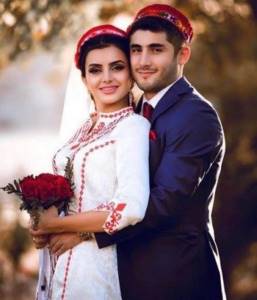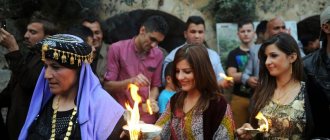Preparation for the first wedding night among Muslims
While the guests are relaxing at the wedding and raising their glasses to the happy life of the newlyweds, the bride is preparing for the fact that she will spend the first night of her life outside her parents' house. Despite the fact that there is practically no tradition of showing a sheet after the first intimacy in a Muslim family, a girl must protect her virginity before marriage. Therefore, before entering into intimate contact with his bride, the groom must show maximum care and patience. According to Muslim customs, this is done as follows:
- the husband puts his hand on the woman’s head and speaks kind words to her, praises her in every possible way and declares his love, reads a prayer - basmala, ending his speech with the words “In the Name of Allah”;
- the newlyweds must read two rakat nafil prayers, after which only the spouse reads another one, in which he asks Allah for blessings on family life;
- the man must feed his newly-made wife with sweets, fruits, honey and milk;
- all Muslim women are very modest, so before entering into intimacy with his wife, the husband must do everything so that she can relax and trust him.
Before the wedding and wedding night take place, it is customary in Islam to transport the bride's belongings and dowry to her new marital home in advance. By the way, an Islamic dowry is 40 pillows and blankets, which people begin to collect from childhood and decorate with their own hands.
As sometimes happens among Muslims, a girl is given in marriage to a stranger. Then it’s understandable why Muslims are afraid of their wedding night. Especially girls who may simply be unprepared for intimacy with their new spouse because they saw him for the first time. A man should show delicacy and maximum patience, and not insist on sexual intercourse on the first night if his wife is not ready to completely trust him. But she, in turn, should not be too cold towards her husband, reject his care and be inattentive. If a woman has her period at this time, sexual intercourse, naturally, will not take place. Moreover, sex on Haida days is haram (prohibited) among Muslims. Muslims spend their first wedding night completely differently from the Orthodox, who first of all count the money they donate and finish the wedding cake.
Despite the fact that most Muslim traditions have already become history, the most important thing to this day remains a warm atmosphere where spouses are gentle and attentive towards each other.
Bismillah is the same prayer on the first wedding night in Islam, which the husband reads with his palm on his wife’s head. He cannot enter into intimate intimacy with her until he makes a dua - this is exactly how the Prophet of Allah taught to first ask to protect his wife and future children who will appear from their relationship from the shaitan. The dua on the wedding night of Muslims is found in Abu Dawud, Nikah (Book of Marriage) 46 and translated into Russian it sounds like this: “Oh, Allah! I ask you for her good, and for the good of her character. And they resort to your protection from her evil and from the evil of her character.” Prayer on the first wedding night among Muslims helps newlyweds get rid of anxiety, get a little distracted and ask Allah for blessings for the family before enjoying each other to the fullest:
Interesting Facts
Surprisingly, most families do not even engage in sexual intimacy on their wedding night. As a rule, this is a boy and a girl who are complete strangers to each other. Accordingly, none of them has the desire to immediately get closer so quickly. This step is especially difficult for girls. It is not uncommon for wives to undress in front of their husbands only weeks after their wedding.
If during the wedding ceremony the bride has her critical days, then all intimacy is postponed. A man is prohibited from harassing a woman, as this is punishable.
The bride and groom try to decorate and diversify their outfit as much as possible. It is believed that richly embroidered and decorated clothes fuel interest in each other. Often the bedroom itself, where the first intimacy takes place, is furnished with original decoration.
After the official marriage ceremony, a man must have sexual intimacy with his woman at least once every 4 months.
In the event that this is not the first marriage for a woman and a man, then they spend 3 nights in a row. If, however, the wedding takes place for the first time, then the number of nights increases to 7.
Traditions and rituals in different countries
Traditions may differ depending on the region. In some places it’s quite a bit, and in others it’s quite significant. Let's look at the different options in more detail.
In Dagestan
Dagestan is a place where people professing Judaism, Christianity and Islam live on the same territory. But there are traditions that are unique to Dagestanis. There are many things that different peoples of the world do not like to do on their wedding night, but only in Dagestan do newlyweds observe the ritual of martial arts. Girls are prepared for this from childhood, and before the first night with her husband, her head is shaved and the areas of her body free from clothing are smeared with fat. The clothes of a newly-made Dagestan wife must consist of a large number of knots that the man had to overcome in order to finally begin deflowering his missus. The sacrament of the first wedding night is not observed here: guests and relatives are allowed to eavesdrop and spy on what is happening, except perhaps entering the newlyweds’ room. The fight could go on for a very long time, but according to ancient traditions, the man must still win, otherwise the girl will be persuaded to surrender or, finally, starved to death. It is not so easy to rid a wife of overalls, but no weapons were allowed, although the wife could suffer physically from the rough actions of a man who sought to take possession of her as quickly as possible.
Among the Arabs
This people, perhaps more often than all the others, observes the tradition of deflowering a girl only after marriage. Arab women are forbidden to talk about their first sexual experience, so unfulfilled women can only guess and fear what is happening in the marital bed. In addition to other Muslim traditions, Arabs strictly follow the ritual of ablution immediately after sexual intercourse. The next morning, the Arabs again gather guests, set a rich table, but both spouses are supposed to remain silent about how the night went.
In the Caucasus
Armenians have also long observed the tradition of taking out the sheet as a confirmation of the bride’s innocence, but reviews from modern residents of the Caucasus indicate that this is a thing of the past. However, many families still honor other traditions: for example, after the first wedding night, the groom disappeared until the evening, and his relatives presented the bride with red apples and silver coins. The bride's relatives were also treated to apples, wine, and money. Previously, this was done only if her innocence before the wedding was confirmed. Otherwise, the woman was put on a donkey backwards and walked through the central streets. Now, of course, maintaining chastity for a single man is not so important for modern society.
It's no secret that eastern peoples honor traditions much more than anyone else. Therefore, girls of a different faith who are preparing to marry a Muslim should expect that she will have to observe some rituals together with her husband. It is better to discuss such issues in advance so that the first wedding night does not pass in a quarrel and does not become the last for their legal union. For a Muslim, as a rule, the faith of his bride is of no value. Almost all Islamic peoples take their religion very seriously, and they themselves will never betray it. But they always dream of a full-fledged Muslim family, where both the wife and children profess Islam. Therefore, despite love despite different religions, girls should look at things realistically and consider all options for the further development of events in a mixed family.
A very colorful celebration, full of Islamic customs. And even though today newlyweds do not follow all the traditions, some of them are still strictly observed. This applies, first of all, to first marital intimacy.
How to spend a wedding night in Dagestan
From an early age in Dagestan, girls are prepared for their wedding night, or rather for battles, which are still carried out in some villages. The wedding night proves that the man who conquered the woman is worthy of her. It could lead to abrasions, scratches and other things. Relatives could only eavesdrop or spy on this action.
The girl was shaved bald, and after that fat was applied to her entire body. The clothes had many knots that the groom had to untie during the battle. As long as the bride could defend herself, she was respected. The use of any bladed weapon proved a man's weakness and was not encouraged.
It happened that a man did not win - then the action was postponed for another day.
Muslims' first wedding night: interesting facts
In addition to Islamic customs, the celebration of the first wedding night among Muslims has a number of additions that make the responsibilities of the spouses more flexible. This makes life easier for spouses in some current situations, namely:
The first wedding night is the sacrament of two hearts. Despite some strict and unusual Muslim wedding traditions, Sharia maintains trusting and tender relationships between spouses. What interesting traditions do other nations support? You can get acquainted with Indian wedding traditions on our website www.site.
A Chechen wedding is a great holiday, but not for the bride’s relatives: they don’t participate in the celebration!
Chechen bride in national wedding dress.
Why is the theme of the first wedding night so relevant?

In Islam, knowledge of the truth is welcomed, and people turn and turned to the Prophet Muhammad precisely for this purpose. These were not only general questions, but also questions about personal life. Many women contacted us regarding marriage issues.
Nowadays, due to the availability of obscene information, not all Muslims adhere to the boundaries of Sharia. Many may sin and indulge in sexual pleasures before their wedding night.
In Islam, such an act is highly punishable, since it is said that a person who sins in this regard, in addition to bringing disaster upon himself, his partner and his entire family, jeopardizes the purity of procreation. Future offspring may not be born completely healthy, or the children will be unhappy because they are born from a sinful person.
In order for the marriage bonds to be strong, for healthy offspring to be born, and for the newly-made family to be happy, Islam has a ban on sexual relations before marriage. Young people in particular should be privy to this, because with the availability of pornographic photographs and videos, it is very difficult to reach the consciousness of the younger generation.
Chechen wedding: hello, how much is the bride?
And the celebration begins from the groom's house. It is here that an honorary delegation gathers, whose mission is to bring the bride to her new home.
The wedding cortege is formed from a very large number of cars, the more the better. Mostly for the bride. The wisest of the wisest - the old men - set off on the journey, and the groom's sister and the mullah (Muslim priest) always go with them.
This is one of the options for decorating cars at Chechen weddings.
In theory, when the guests arrive, the bride should be sitting in all her glory with her suitcases packed and ready, already prepared. But, as usual, the girls are late, so the old men gather in a separate room and have leisurely conversations.
When the bride is finally “in parade,” she is ransomed. The amount of dowry is determined by the mullah. The groom's relatives may give more, thereby emphasizing their good intentions and the importance of their relationship to the bride's family. After this, the mullah goes to the bride’s room, where, in the presence of two adult married women, he conducts the “marriage” ceremony.
The next task of the mullah is the same procedure only with the groom, two men act as witnesses, and here it doesn’t matter whether they are married or not. It is advisable to do this before the bride steps into her betrothed’s house. After which the newlyweds are considered married.
Tajik customs and traditions
Tajikistan is a rich country, with more than 20 different nationalities living in it. This means that several different nations can be gathered on one territory at once. In Tajikistan, people still live according to ancient rituals and traditions to this day.
It is surprising that modern people are so sincerely and devotedly trying to observe all those customs that were left by their ancestors. People believe that not following tradition will lead to an unhappy life. This is especially true for such important topics as the birth of a new family. This is a special ceremony that includes several stages.

Tajiks are descendants of East Persian people, which means they have eastern roots. Due to the fact that the country is home to many different nationalities, it can boast of a large number of religions and superstitions. That is why you should not be surprised to see completely different traditions within one country.
On your marks! Attention! March!
After the bride is ready, the groom's brother goes after her, takes her hand and leads her out of the room. But it was not there! The bride's sister is blocking his way, so he has to pay him off! That's it - the road is clear! The brother takes the bride out of the house, sits in the front seat, and the groom's girlfriend and sister sit in the car with her.
A Chechen bride is taken out of her home.
The motorcade starts moving - and then the racing begins! Each of the numerous cars tries to take a place behind the bride's car. This is both prestigious and profitable - an expensive prize awaits such reckless people in the groom’s house: for example, a carpet or a separate table of honor.
But don’t speed up too much: at any moment, adults or children may block the road, demanding payment for the journey. After all, a Chechen wedding is a holiday for everyone!
The groom's mother meets the bride at the house, helps her get out of the car and gives her a bite of candy or some other sweet, then takes a bite herself. At this moment, shots and even machine gun fire are heard. This kind of recklessness has now turned into real fun.
In fact, initially loud sounds were used to scare away evil spirits from the house, but previously it was enough to fire a couple of shots.
Chechens' first wedding night
It took place on the third day of the wedding - only then were the newlyweds left alone. In order to perform the marital ceremony, the groom put on a suit, which the bride's relatives had obviously given as a gift, and went to the designated place. The woman should already be in the room (married friends will take her there).
Before intimacy, the groom must open the Koran and pray. The book is then covered with linen and the act of bonding and deflowering begins. It is optional for those who knew each other before marriage.
Chechen wedding: bride, Come to the corner, quickly!
The groom's brother takes the bride into the house and puts her in the most honorable place - in the corner! Yes, this is where she will spend her most important day in her life.
In order for a son to be born first in the family, a boy is brought to the bride, she takes him in her arms, pats his cheeks, kisses him and lets him go, rewarding him with a gift or money.

The Chechen bride stands with her head down in the corner of the room.
The feast begins, everyone congratulates the groom's parents, wishes for more grandchildren and all sorts of blessings in general. Everyone comes to a Chechen wedding - no invitations. As soon as the bride enters the house, dancing begins.
But here, too, everything is not so simple. The improvised dance floor is divided into two parts: a semicircle for men, a semicircle for women. A couple dances in the center, chosen by a man who takes on the role of “dance toastmaster.”
A Chechen bride stands modestly in a dance circle.
All this time, the bride stands like a statue in the corner: she is not allowed to sit in the presence of her elders. Women come up to her and look under the veil. After some time, the groom's mother raises her veil. Next to the bride is a bridesmaid who is allowed to sit and eat. After some time, she is given a gift and taken home.
They are famous for their traditions, and here the next test for the bride is the ritual of “untying the tongue.” The men approach the girl, bombard her with jokes and ask the bride to bring her water. She must break for a long time and be laconic.
The stingy “enjoy your drink” is the loosening of the tongue. For this, the man must give the bride money, otherwise she may not talk to him for the rest of her days (I must say that such cases do happen). In the end, the girl collects a decent amount of money, which she, as a rule, gives to her mother-in-law.
Wedding fun in Chechnya lasts up to three days.
“Caucasian Captive”, or Georgian Wedding
According to all traditions, a Georgian wedding is the brightest, most romantic, rich and spectacular holiday in the life of every Georgian family. Traditions here are as strong and significant as ever, so in order to arrange a truly national Georgian wedding, you will have to try hard.
According to Georgian customs, a wedding consists of three parts, according to which the celebration is planned.
Before the bride enters their future joint home, the groom releases a white bird. After this, the newlyweds are served a glass of wine. First the groom takes a sip, then puts his wedding ring in it.
Afterwards the bride drinks. Then the groom takes a ring from the glass and puts it on his beloved’s finger, pronouncing his wedding vow - words of love and fidelity.
Honey for the bride
The bride can smear her lips with honey so that she will be kind and kiss her husband sweetly, so that her speech will be pleasant and praise her husband.
"For luck"
Before entering the house, the bride and groom break a beautiful plate “for luck” and wealth. You can break raw eggs on door frames or smear them with butter and honey.
They scatter grains in the corners of the house with their own hands, and also walk around a pot of butter or wheat grain three times - to peace and harmony in the family.
National songs are always played at a Georgian wedding. If you know in advance that the guests will be shy and sing modestly, then invite a professional choir and dance group.
The fiery lezginka performed by brave, slender dancers will ignite the blood of both young and older guests so that it will be simply unrealistic not to start dancing. Those who don’t know how will learn quickly and with pleasure, since the national Georgian dance is one of the most fiery and beautiful.
Bride kidnapping
This wedding ritual is the most romantic, even if it occurs with the consent of the bride and her parents. This is a unique alternative to a traditional Georgian wedding with an endless number of guests and large expenses that not every family can afford.
Such a marriage is considered officially valid, and the celebration itself is celebrated in a narrow circle of closest relatives. If you have a strong desire and opportunity, you can have a lavish wedding in a few years, or you can do without a feast halfway around the world.
But bride kidnapping can also be one of the elements of a wedding. A few days before the holiday, the groom “secretly” takes the chosen one to his house, so that during this short time she no longer wants to return home to her parents. This act is proof of the courage and strength of the young man.
The power of Georgian wedding traditions is very strong to this day. On the one hand, such a wedding seems a little limited by customs, but on the other hand, it is an unusually beautiful and memorable event.
Chechen wedding - to be continued
Several months pass after the wedding and, according to tradition, the groom must visit his new relatives - his wife’s close ones. A day is set, expensive gifts are prepared. The groom takes friends with him, whose task is to respond wittily to the jokes and ridicule of the male half of his wife’s relatives.
Tables at Chechen weddings are now set according to all modern trends.
On this special day, relatives gather at the festive table, eat, drink, and communicate. When the official part comes to an end, the groom's parents say goodbye and leave. The groom himself leaves, but in order to return... with his lads. The delegation heads to the bride's house, leaving the groom around the corner of the house. Here representatives of the brother-in-law's brother-in-law's lads are waiting for them and inviting them into the house. The groom's name is called, and he, as if embarrassed, enters the house.
The test for the groom is to enter the house in shoes without offending the household. If you leave your shoes unattended, something will definitely be poured or added into them, or they may simply be nailed to the floor. Resourceful friends come to the rescue: the groom bends down, pretending that he wants to take off his shoes, but then he is “unexpectedly” pushed into the house. And the shoes are intact and the groom turned out to be well-mannered.
You can’t do without musical accompaniment at a Chechen wedding.
Everyone sits down at the table: on one side is the bride’s side, on the other is the groom’s. The groom himself stands motionless as a rock all the time to the side, modestly bowing his head (this is retribution for the “bride in the corner”!). Those gathered eat, drink, and make jokes towards the groom. From time to time, children may enter the room and approach the groom. He must give money to each child. Then the girls take the groom to another room, where he is finally seated at a table with treats.
In Chechnya, when meeting parents and relatives, the groom is given a gold ring or gold bracelet.
Caucasians prepare carefully for marriage, since the creation of a young family and continuation of the family is considered a particularly important event in everyone’s life. The ancient traditions of the Chechen wedding are also present in modern weddings. This great holiday is shrouded in original rituals and colorful elements of Caucasian culture. The girl gets married, and the man gets married strictly with the consent of the parents of both families.
Rituals of Tajikistan - matchmaking, engagement, wedding
Tajik weddings cannot take place alone. It usually includes a large number of people. Tajiks are distinguished by their special cordiality and hospitality. That is why not only the closest people, but also acquaintances and even completely unknown people are invited to wedding ceremonies.
It is generally accepted that if a stranger enters a Tajik’s house for a marriage, he will definitely be seated at the table, given food and drink. Such good nature, warm welcome and open soul with heart are important characteristics of the Tajik people.
It is noteworthy that it is customary for Tajiks not only to attend a wedding, but also to help in organizing the celebration. This means that neighbors come to the house of the bride and groom (depending on whose side they are invited) and offer their help.
As a rule, newlyweds will definitely have several tasks that they can easily entrust to their assistants. No one is offended by such an action and everyone is happy to help each other. Such an atmosphere of mutual assistance and kindness reigns even before the wedding.
Currently, Tajik weddings are of a slightly different nature, but nevertheless the main characteristics remain unchanged. The wedding ceremony takes place in 7 days. This means that events replace each other. Initially, you should get permission from the bride's parents. This is considered a matchmaking ritual.

To conduct matchmaking, two women from the groom’s side come to the bride’s house. As a rule, these are his close relatives (without a mother). The matchmakers announce the purpose of their visit. Surprisingly, in Tajikistan the issue of wedding is decided by the most respectable family members.
These are grandparents. If the matchmakers manage to persuade them, then on the same day the question of the day on which the marriage will be concluded is decided. It is chosen based on the religious calendar. Tajikistan is home to religious people who follow the rules of Islam.
As soon as the main organizational issues are settled, the so-called engagement begins. Tajiks gather with relatives, closest friends and neighbors. At the evening, the head of the family announces the reason for everyone’s gathering. Guests are treated to a traditional dish, pilaf.
The next day, all guests exchange gifts intended for the newlyweds. After which the cattle with food are sent to the bride’s house. Traditionally, the wedding feast is organized in the girl’s house. This is why the groom sends a large amount of food to the bride.
On the sixth day, the Nikah religious ceremony is performed. It is organized by a church minister who unites the young before higher powers. Now, according to religious canons, the young can be considered husband and wife.
Only on the seventh day is the traditional wedding feast held. It is usually attended by a large number of people. They all came to congratulate the newlyweds on their happy day.
Features of the wedding traditions of the Chechen people
According to the traditions of a Chechen wedding, the surname of the future bride is carefully checked through the maternal and paternal lines of three generations in order to avoid possible incest. In addition, the bride is assessed taking into account the wealth of her relatives, reviews of neighbors and acquaintances. The groom must save up a decent amount of money, since his family will treat all the guests invited to the wedding; a lot of finances will be required for matchmaking and bride price.
Matchmaking among Chechens occurs in a unique way. Even during the acquaintance, the guy who liked the girl would pass her candy as an intermediary as a sign of interest and attention to her. The girl “reciprocated” - she gave the man two handkerchiefs. Such courtship was repeated two more times, after which the young man learned from the girl the final decision regarding the creation of an alliance between them. The Chechen woman's father had the last word.
Bride price and bride price
There is a misconception that the groom literally “buys” the bride from her parents. In fact, this is a psychological step, the essence of which is to show your worth and generosity. With the ransom, the Chechens demonstrated their gratitude to the bride's parents for their daughter, extolling the essence of man over material values. The mullah says the amount of the dowry. But the relatives of the young man always give more money, demonstrating their good intentions and positive attitude towards the bride and her family. Kalym is usually given to the bride as the first capital for starting married life.
Ritual “Chokhi”
On the eve of dressing the bride in her wedding attire, ritual bathing was carried out. The bath was fumigated with aromatic herbs, and infusions of medicinal herbs were added to the water. The girls applied symbolic designs to their clean and fresh skin – stripes on their backs and arms. Next, they performed the “Chokhi” ritual. The newlywed's aunts and friends pinned a new needle to the hem of the wedding dress to ward off the evil eye and evil forces. Beans, an ear of corn, and apricot or peach pits were secretly hidden in the newlywed's dowry. This action was a wish for the girl to become a mother of many children.
The newlywed was given a beautiful handkerchief, inside of which was wrapped a silver ruble and a ribbon. The bride kept these gifts, along with the needle on the hem of her dress, all her life as an expensive heirloom. Next, the bridegroom's friends ransomed the young woman. Fun, ringing laughter, and eloquent arguments on both sides (bride and groom) about who owns the newlywed reigned in the courtyard of the young woman. The hero of the occasion collected the dowry, then the wedding cortege headed to the house of the betrothed. The guests went home, leaving only the young relatives who had arrived from afar.
Arrival of a mullah for marriage
The wedding ceremony according to the Koran is performed by a mullah, a representative of the Muslim clergy, first in the house of the newlywed, then at the groom's. All outsiders left the home, except for the bride herself, the best man and two already married women. The ritual was carried out against the evil eye, leaving only the above-listed ritual participants in the room. The best man led the young woman around the hearth three times, then broke the iron chain or rope. This ritual symbolized the daughter's break with her family.
The mullah carried out the same procedure in the newlywed's room, where two men were present. It didn’t matter who testified in front of the groom - young guys or married men. The mullah’s task is to have time to complete the ceremony of marriage between the groom and his betrothed before the wedding procession with the bride arrives at the young man’s house. After the ceremony, both families believed that the young people were already married.
Wedding train
A wedding procession is being prepared in the groom's courtyard, the purpose of which is to bring the newlywed to her future home. The wedding train is formed from a large number of cars. The first and most attractive car is for the bride. The wisest old people, the betrothed's sister, and a Muslim priest (mullah) are going on the journey. The wedding train quickly rushes to the bride's house, with each driver trying to overtake his neighbor on the road. Such “races” are stopped by the first car for the bride, slowing down to avoid accidents.
The bride's guests and relatives are looking forward to the groom's wedding procession. And when the “train” has already arrived, the guests get to know each other. There is fun and laughter everywhere. The bride's parents treat the arriving guests with various delicacies. Then the symbolic “matchmaking” begins and zaohalol - Chechen dances. After some time, the procession picks up the bride, and the wedding train takes the newlywed to the house for the upcoming holiday. There the bride is shown a corner where she will stand until the end of the wedding celebration.
Tradition “Rug with a broom”
Upon arrival of the wedding train, the bride will have another test - a mat with a broom. The newlywed, to the joyful exclamations and congratulations of the guests, goes out onto the carpet to her mother-in-law's house. There is a broom and a small rug in front of her. Her task is not to miss these “gifts”, showing her thriftiness, to take them aside. The Chechen women on the betrothed side shower the bride with money and sweets, present the mother-in-law with a spoonful of butter and honey, and then give it to the daughter-in-law to try.
The custom of “Mott Bastar” - “untying the tongue”
As evening approaches, the bride is involved in the ancient ritual of “untying the tongue.” The mother-in-law and adult men are always present here. The newlywed presents a bowl of water to the elder of the wedding. When he asks if he can drink, the young woman replies: “Drink.” But before this, the young guys laugh, entertain the bride, trying to get her to talk. The girl must endure not to say a word. After hearing “drink,” the groom also tries to get his wife to talk. The bride “looses her tongue” only after the groom gives her money. According to tradition, she transfers this amount to her mother-in-law.
Tradition - taking the daughter-in-law to the water
A young Chechen daughter-in-law, after a noisy wedding celebration, had to enter the groom's family according to a special ceremony. An already married woman, cheerfully surrounded by young people, was taken to the nearest body of water. The daughter-in-law carried a large jug and had to draw water after the ritual. The day before, they baked a cake inside with a needle, which was on the hem of the bride’s dress during the wedding. This pie was thrown into a pond, then they shot at the culinary product. Everyone, cheerful and happy, with water in a jug, returned to the village.
How is the first night of the newlyweds spent among the gypsies?
The most basic ceremony among gypsies at a wedding is the “carrying out of honor.” The first wedding night receives such significance because the outcome of events will be extremely important for the entire bride’s family, because if the girl was not innocent, then her family will be forever disgraced. She herself will have difficulty, and perhaps not at all, be able to find a husband.
The groom goes with his bride and three women to the chambers, where the girl’s virginity will be tested. There are several versions of how the gypsies perform the ritual of deflowering during their wedding night:
- The newlyweds go to a separate room, and the women remain outside its door. When the proof of innocence (a sheet with a blood stain) is in their hands, women can bring it out for everyone to see;
- Women themselves deprive the bride of her virginity by wrapping a sheet around her finger. The groom is only allowed to observe, but not to touch under any circumstances;
Among the gypsies, the ritual of the first wedding night ends in a rather unusual way. The sheet is placed on a tray, covered with red ribbons, which all the groom’s relatives can then take for themselves.
At the end of the ceremony, the groom’s side of the family thanks the bride’s father and mother for raising a decent daughter. Then the parents on both sides are blessed with the icon. Gypsies must have large families, so they cannot do without the wishes of many heirs, most importantly, healthy and strong ones.
From this moment on, the newlyweds can be considered real husband and wife.
People of all these nationalities honor the traditions of their ancestors to this day, because they believe that this is the only way to live a long and happy married life. Muslims and Gypsies are not allowed to divorce. Even if your husband cheated, you can survive, but if a woman cheated, then she disgraced her entire family, which after this may not accept her. Who knows, maybe marriage lasts for life, because they honor the traditions of the first wedding night, and a woman preserves her innocence for her only man.
Source: WeddingTalk.ru
That is a night full of secrets, which the newlyweds anxiously await. It is advisable for young people to put on elegant clothes and perfume themselves with incense. The groom entering the bride must first greet her, give her a small gift, treat her with something and have a heart-to-heart talk. Then it is advisable that the young people separately perform two rak'ahs of prayer and ask Allah to make their lives happy and full of abundance. This will help young people to get a little distracted and calm down, because namaz has a powerful psychological effect.
If the wedding night falls on the bride's menstrual cycle, then sexual intercourse, of course, is postponed to other days, because sexual intercourse on Haida days is haram.
I would not like to ignore the custom, still widespread among Muslim peoples, of waiting for the completion of sexual intercourse between young people outside the door of the room in order to check the bed and make sure of the bride’s innocence. But controlling the newlyweds, exploring issues that should remain secret between spouses, is a custom that leads to haram. This custom violates Islamic injunctions not to spy or spy on other people. He makes public what should be a secret between spouses, for their relationship is the sacrament of marriage. A situation may also arise in which the bride may become the object of unfounded suspicion, and her honor and dignity may be harmed. Such customs can cast a shadow on the relationships of young people and darken their entire subsequent lives. Therefore, Muslims should make every effort to abandon such practices that are contrary to the principles of Islam.
The first wedding night requires patience and delicacy. A man has a lot of responsibility on his shoulders. The fright and excitement of the bride are quite normal and the man must do everything so that this night does not disgust the bride and does not frighten her, because this can leave an imprint on her whole life.
Firstly, it is quite difficult for a girl to leave her parents’ house, where she spent all her years, and start a new life in a new house, to submit to a man, and at this moment she really needs understanding and affection. No woman will ever forget her first man. And if the first night is full of new and pleasant sensations, if everything is surrounded by affection and love, she will be grateful to him all her life. Even if they separate for some reason, the memories of the first night will always give them pleasant feelings.
Some young men think that on the first night they need to show their masculinity, and act rudely and tactlessly. The wedding night requires delicacy, and the man must give more than he takes. Every man needs to learn that the first night can have a great impact on the future life of the family.
You can't start straight away with undressing. It is advisable that the girl do this herself. In this case, under no circumstances should you immediately greedily examine the bride’s body. In most cases, when undressing in front of a man for the first time in her life, a girl experiences unprecedented shame. The man's body makes her afraid. Therefore, for the first time it is necessary to turn off or reduce the light of the lamp or undress behind a curtain, and it is best for the man not to look in the direction of the bride. First you need to take off your outerwear, and your underwear in bed, under the covers.
On the first wedding night, love games and caresses are very important. No matter how shy the girl is, no matter how awkward she is, she will gradually begin to calm down. If the man shows delicacy and behaves as expected, the bride will slowly begin to awaken desire.
Defloration is not a painful act, as it seems to many girls. This will not cause any trouble to a normal girl or boy. The main thing is to prepare the girl for sexual intercourse with preliminary love games. If the bride cannot calm down and is very nervous, the groom should try to understand her and postpone sexual intercourse until the next day.
Excessive persistence or brute force can cause a girl to develop a disease called vaginismus. With this disease, spasm of the female genital organs occurs, and penetration of the male genital organ into the vagina becomes impossible. Even if sexual intercourse occurs, it causes excruciating pain in the woman.
Source: islam-today.ru
From morning pilaf to the first wedding night. Wedding ceremonies of modern Uzbekistan
The more magnificent and brighter, the better. And now we are not talking about dresses, but about the wedding. Tashkent wedding. Kaktakto has already talked about what precedes this celebration. Having gone through a difficult path from finding each other to engagement, having survived possible disagreements at the stages of collecting the bride's dowry and exchanging expensive gifts, the bride and groom find themselves one step away from the main event that will unite their destinies.
A modern wedding in Tashkent consists of three events: nakhor oshi, nikah and wedding evening. This is followed by the first wedding night and kelin salom, but first things first.
Let's make a reservation: registration in the registry office itself, by traditional standards, is not considered some kind of ceremonial event and can be carried out on any day between the engagement and wedding celebrations. Only young people and witnesses go to sign; friends of the groom and bridesmaids, parents and other relatives, as a rule, are not invited.
What is this
“Nakhor oshi” literally translates as “pilaf served early in the morning.” The day of the Uzbek wedding begins with this culinary ritual; the meal is scheduled for 6 or 7 o’clock in the morning. Only men are invited to it - both from the bride's side and from the groom's side (with the exception of the groom himself). The bride's relatives are responsible for organizing nakhor oshi.
In the old days, the day before the wedding, the groom's side sent several live rams, a bag of rice and carrots, half a bag of onions and several dozen liters of vegetable oil to the bride's house. From these products, the bride’s relatives spent almost the entire night preparing pilaf in huge cauldrons, which was enough for several hundred people. Relatives, family friends and neighbors gathered for this purpose. That night, a festive atmosphere reigned in the bride’s house; ordinary cooking turned into a real celebration. By early morning the pilaf was ready. Long tables were laid and from 5 or 6 in the morning people began to come to Nahor Oshi.
A difficult path down the aisle. Pre-wedding rituals of modern Uzbekistan
Today, nakhor oshi, like weddings themselves, are held in special restaurants, which in Uzbekistan are called “tuykhona” (translated from Uzbek as “wedding venue”). The beautifully decorated rooms in such restaurants can easily accommodate from 300 to 1,000 people, and local chefs prepare wedding dishes (including morning pilaf). No one gives the products to anyone anymore; instead, the groom’s side pays for the cost of the ingredients.
Rules
It is customary to arrive 10-15 minutes before the start of the celebration. Being late or, God forbid, ignoring an invitation is only allowed for a really serious reason.
In general, from 200 to 500 people are invited to the morning pilaf, which usually lasts no more than an hour. The bride's father and her close relatives line up at the entrance to the restaurant and greet the guests.
The ceremony begins with tea drinking to the sounds of traditional Uzbek music at tables laden with oriental sweets, almonds and pistachios. After about 10-15 minutes, the invited mullah begins a sermon about family values and the role of spouses in the family, reading suras from the Koran. At the end of the spiritual part, pilaf is served on the festive tables.
What is the price
Today in Tashkent, the total cost of khor oshi for 300 people is 10-15 million soums ($1,265-$1,900).
While the relatives are having breakfast with pilaf, the groom is preparing for his visit to the bride’s house. The visit itself - in the wedding procession - usually takes place in the afternoon. The future husband is accompanied by friends. At the bride's house they are met by musicians with karnay and surnay. To the sounds of these Uzbek national instruments, the groom enters the house of his future wife. Here a treat awaits him - the same pilaf from Nakhor Oshi.
A line of his bachelor friends lines up in front of the groom, whom the groom feeds directly from his hands (precisely from his hands, not from a spoon). It is believed that in this way the groom conveys a “wedding aura” to his unmarried companions. After such a meal, the guy goes to a separate room where his bride and mullah are waiting for him. The latter conducts the nikah ceremony - asks the young people if they agree to marriage, reads suras from the Koran and a short sermon about family life.
Collect the dowry and not disrupt the wedding. Pre-wedding rituals of modern Uzbekistan
Having become husband and wife - both according to secular laws and according to the canons of Islam - the newlyweds, accompanied by friends, go on a short trip to the city's attractions, according to a pre-planned scenario. The final destination of their route is Tuykhona, where the main wedding celebration will take place.
If morning pilaf is an event exclusively for men, then their participation at a wedding evening in Tashkent is strictly limited. The female part of the relatives, as well as friends of the bride and groom, are invited to the evening celebration. Of the men, only friends of the groom and close relatives of the couple are allowed to be present.
First, guests are seated at the festive tables. The bride and groom are the last to enter. On the way to the “pedestal”, where the main seats in the hall are located, the bride makes several bows, stopping near the groom’s close relatives.
As a rule, the wedding celebration begins around 6-7 pm and ends no later than 11 am. All expenses for this event (from 80 to 200 thousand soums or $10-$25 per guest) are covered by the groom's side. They also pay the costs of renting a wedding procession, decorating a banquet hall, and fees for musicians, artists, and singers.
At the end of the evening, the cortege takes the newlyweds to the groom’s house, where they are expected...
A serious test for the bride is the first wedding night, at the end of which the girl will have to demonstrate blood stains on the sheet. To do this, on the first wedding night, several relatives of the newlyweds stay overnight in the room adjacent to their bedroom. Previously, the tasks of older women included not only inspecting bed linen on the morning after the wedding - they also gave newlyweds advice on how to protect themselves from possible injuries on the first night, heated water and served it in basins, and provided any assistance if necessary, including medical. Today, none of the young people ask for advice, and hot water supply is the norm, but the ritual has been preserved in order to confirm the “purity” of the young wife.
How brides are chosen in Tajikistan. Three real stories
If the newlyweds do not get intimate on the first night, then the aunties and grandmothers go to their homes, and after that the newlywed will have to demonstrate “proof of her virginity” to one of her husband’s relatives. After all, if he or one of his relatives questions his wife’s virginity, the matter will probably end in a quick divorce.
By the way, stains on bed linen are not necessarily shown openly, inviting those interested into the bedroom. It is enough to leave a soiled sheet in one of the common rooms - whoever needs it will definitely find it.
The wedding ceremony ends with the ceremony - kelin salom (“welcome to the bride” translated from Uzbek). It goes like this: the next morning after the wedding, close relatives gather at the husband’s house. Accompanied by folk songs performed by specially invited women, the bride in national costume with her head covered bows first to her husband’s parents, and then to each of his relatives. In return, those welcomed give the newlywed valuable gifts - gold jewelry, carpets, interior items... After such an “exchange,” the invitees are called to the table to sit and drink tea. And, in general, that’s all - after the last guest has left, the family life of the young people finally begins.











